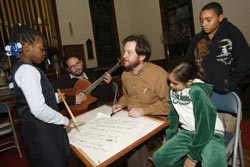|
Among the young musicians is 10-year-old Azahnah Smith, who sings lead vocals on several of the songs written, produced and composed by the talented group of youngsters who call their music group The Little Saints.
“I had a lot of fun,” Smith said. “You get to talk about things that bother you and make music with your friends.”
Hear Our Voices is a 14-week songwriting program that is offered through Arts at Your Side, the community service initiative of Temple’s Arts and Quality of Life Research Center and is supported by a $3,000 grant from the Mid-Atlantic Region of the American Music Therapy Association. The purpose of Arts at Your Side is to provide specially designed arts experiences and arts engagement directly to underserved residents of the Philadelphia region to positively influence their lives and improve well-being. Hear Our Voices is run in conjunction with after-school services at the Hancock St. John Learning Center located off of East Girard Avenue.
“As children discover musical options through the creative medium of songwriting, they also become aware of their ability to find creative ways to deal with situations in their everyday lives,” said Cheryl Dileo, director of the Arts and Quality of Life Research Center.
Like many of her peers, Smith has been a witness to violence in Philadelphia. The purpose of the program is to help students like Smith find a creative release for their thoughts and emotions.
“Youth have an extreme need to tell their stories but may not always have people around who truly listen,” said Joke Bradt, assistant director of the Arts and Quality of Life Research Center. “The Hear Our Voices songwriting program provides the kids with a new and exciting medium to let their voices be heard, and it stimulates collaborative exploration of coping strategies and solutions.
“As you listen to the songs, it is clear that these kids have a lot of important insights to share related to violence, poverty, education, and much more. I hope their songs will make us all listen,” Bradt said.
As part of the program, “The Little Saints” produced their own CD, which they dedicated to the victims of violence in Philadelphia, the casualties of the Iraq War and Officer Charles Cassidy, who was slain by a would-be robber in November.
On their first track, titled Everyday Life is Crazy, the young musicians sing about how they cope with the violence in their neighborhoods and schools.
Following an evaluation of the program, Bradt hopes to replicate Hear Our Voices in regional community centers that serve at risk-youth. For more information on the Arts and Quality of Life Research Center’s programs, please visit www.temple.edu/boyer/ResearchCenter.
|
